Being Kind Works. It works for strengthening employee engagement, enhancing company culture, building higher performing teams, and nearly any of the other priorities on a C-Suite agenda.
Kindness is the most powerful tool that we have to build stronger workplaces. And it is a tool that is available to EVERYONE. We aren’t talking about surface level Kindness. We don’t mean to be a constant people pleaser. We are talking about authentic Kindness based on developing empathy, listening to others’ ideas, practicing gratitude and recognition, giving actionable feedback, having hard honest conversations, and connecting deeply with others.
Unfortunately, many employees (31% according to the 2022 Businessolver’s State of Workplace Empathy) do not feel their leadership is empathetic. That perception is highest amongst the Gen Z portion where nearly 2/3 (61% by the same study) do not view their CEO as empathetic. Empathy isn’t just a ‘nice to have’. It is the basis of building inclusive and equitable workplaces that generate results. It is the basis of effective leadership. It improves motivation, communication, bias for action and adaptability. In 2017, that same study showed 60% of employees would be willing to take slightly less pay if their employer showed empathy, and 78% stated that they would leave an employer for equal pay if the other company was empathetic.
Leadership struggles are widespread and often very similar across industries and geographies. Employee engagement, morale in times of uncertainty and perhaps layoffs, return to work, connection challenges in the hybrid and remote world, and authentically building DEI into the culture are just a few of the challenges. Leaders are often at a loss on how to maintain high performance and productivity in the midst of it all. Bringing Kindness into your workplace is the solution. Building empathy, practicing listening, encouraging human connections, and all of the tools of authentic Kindness in leadership is the future of work.
Expectations of employees have changed. Gone are the days where employees stay at the same company for their full career. For Gen Z and millennials, the average tenure in a company is less than 3 years according to Zippia, magnitudes higher than any previous generation. And many are choosing not even to join the traditional workforce at all, opting instead for a ‘portfolio’ career.
For companies to keep up with the changing workforce, it is imperative that they take a deep look at their culture and build for the future. As a recent Forbes article highlighted, ‘Companies can also become endangered if behaviors and culture don’t adapt to meet new norms.’
Calling the elements of Kindness ‘soft’ skills undermines the strength of their proven benefits. ‘Soft’ skills aren’t soft at all. Calling them ‘soft’ creates a tension within leadership and instead we should think about them as ‘power’ skills. Even though most (69%) of CEOs believe it’s their job to build empathy at the workplace, most (79%) also say they struggle with it. 77% of CEOs fear losing respect if they are too empathetic, a stat that has only increased in recent years according to the same 2022 Businessolver’s State of Workplace Empathy.
We want to take a step away from calling these skills that are the most critical in leadership ‘soft skills’. Being Kind WORKS. It works to boost employee engagement, job satisfaction, well-being, connectivity. It is the strongest tool we have to build stronger workplace cultures. It supports individuals and companies to develop their ‘power’ skills. And it grows the bottom line.
How do we know that being Kind at work works? Why did we build KindWorks? Below are just a few of the studies that indicate the huge potential for practicing authentic Kindness at work to enhance culture and build higher-performing teams.
Empathy & Leadership Effectiveness (including business growth) are closely correlated
In an international study of over 200 managers, empathy was strongly correlated with leadership success. Leadership effectiveness was measured across two subscales as outlined in the figure below from the study. Both behavioral characteristics and organizational performance were evaluated. The cross-cultural study showed that as empathy increases, so does leadership effectiveness. The study also reported on the cultural differences between the two countries in the study, US and Malaysia. While the US reported higher rates of empathy in leadership and higher impact on business results based on empathy, the study also showed that the benefits of empathetic leadership translate cross-culturally.
In a time of constant workplace change, return to work, and a need for new employee engagement methods, empathy cannot be underestimated.
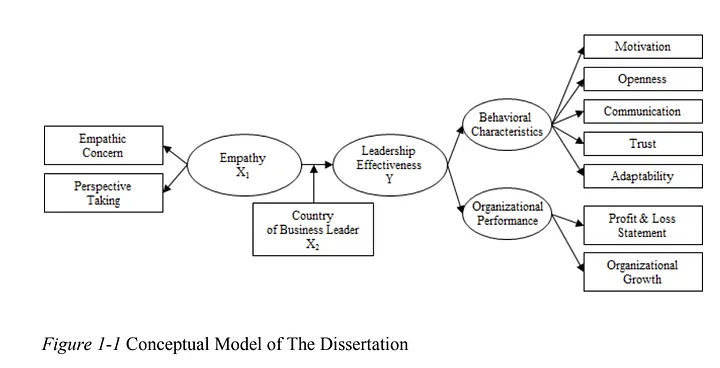
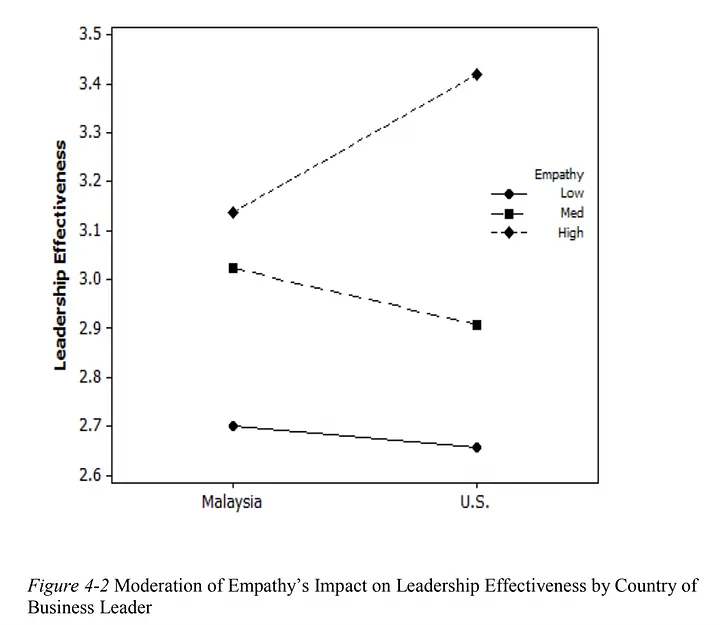
Source: Castelli, Patricia & Wan Abdul Rahman, Wan Afezah. (2013). The impact of empathy on leadership effectiveness among business leaders in the United States and Malaysia. International Journal of Business, Economics and Management. 83–97.
Gratitude helps us react less severely to stressful situations with our teams
We all experience stress at work. Wouldn’t it be nice if there was a way to help keep our heart rate calm when we encountered stressful situations with our teammates? It can be as easy as showing gratitude to your colleagues.
In a study measuring the impact of gratitude on the effectiveness of teams, researchers randomly assigned team members to express gratitude to their teammates. Subjects were then placed into stressful situations with those same teammates. The individuals who expressed gratitude reacted significantly more positively when the work got stressful than the control group. They showed less physically severe cardiovascular reactions to stress when working both with their teammate on a stressful task, as well as when working on stressful tasks alone.
The study used a challenge–threat index composed of cardiac output and total peripheral resistance to measure the reaction to stress. Results indicate benefits to lowering stress reactions during intense moments both for teamwork and individual tasks. The authors indicate that the findings ‘suggest that workplace gratitude interventions can promote adaptive stress responding in teams.’
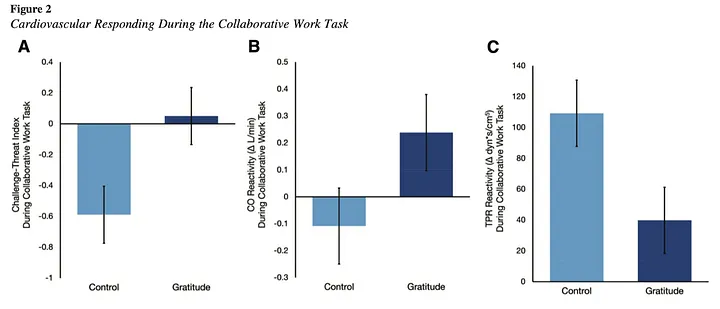
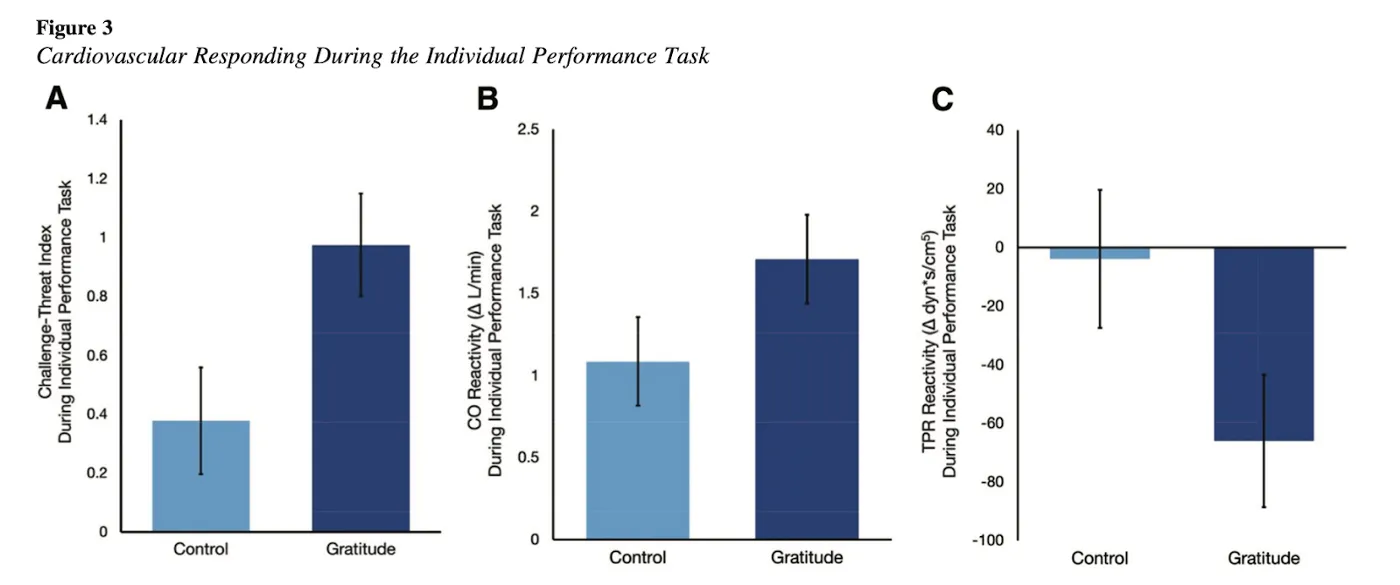
Source: Gu, Y., Ocampo, J. M. A., Oveis, C., & Algoe, S. (2020, December 21). Gratitude Expressions Improve Teammates’ Cardiovascular Stress Responses.
Giving Kindness at the workplace results in higher competency, autonomy, and job satisfaction.
In a 2017 study, about 1,200 employees from the Coca-Cola offices in Madrid participated in a study measuring the benefits of prosociality in the workplace. Participants were randomly assigned into 3 groups, ‘Givers’, ‘Receivers’ and ‘Control’. The Givers were instructed to perform acts of Kindness for receivers. The Givers had autonomy on what Kindness actions they chose to take and received ideas such as ‘“bringing someone a beverage” or “emailing a thank you note”.
The study proved the researchers hypothesis of (1) mutual benefit for both the Givers and the Receivers and (2) Kindness is ‘contagious’ with Receivers having a pay-it-forward reaction. Receivers reported almost 3 times as many prosocial acts as Controls and shared more and more Kindness acts as time went on in the experiment. And the benefits of competence, autonomy, happiness and satisfaction displayed in both short term and long term effects. Somewhat surprisingly, the benefits are the highest in the Giver, especially over the longer term (2 months) where they reported significantly higher life and job satisfaction and fewer symptoms of depression.
For thriving workplaces, it is important to build a culture where employees feel competent and motivated and where everyone is performing at their peak performance. Developing a basis of Kindness is a simple and impactful way to drive these results.
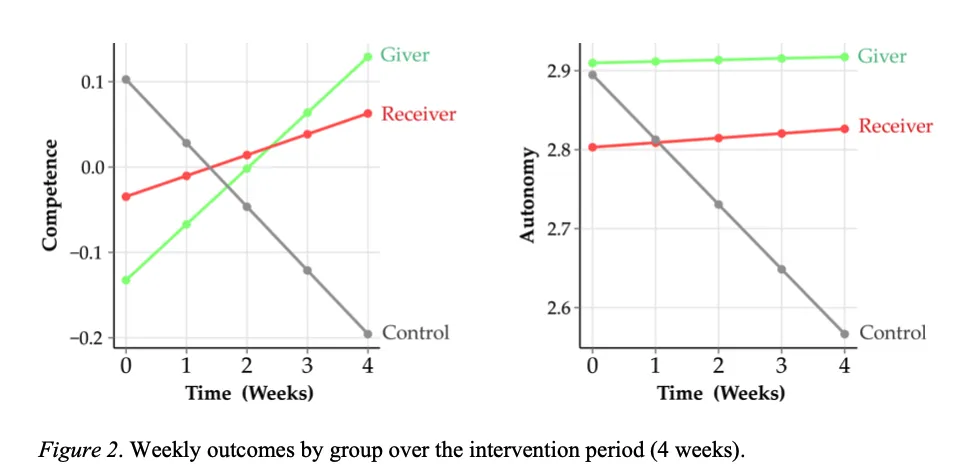
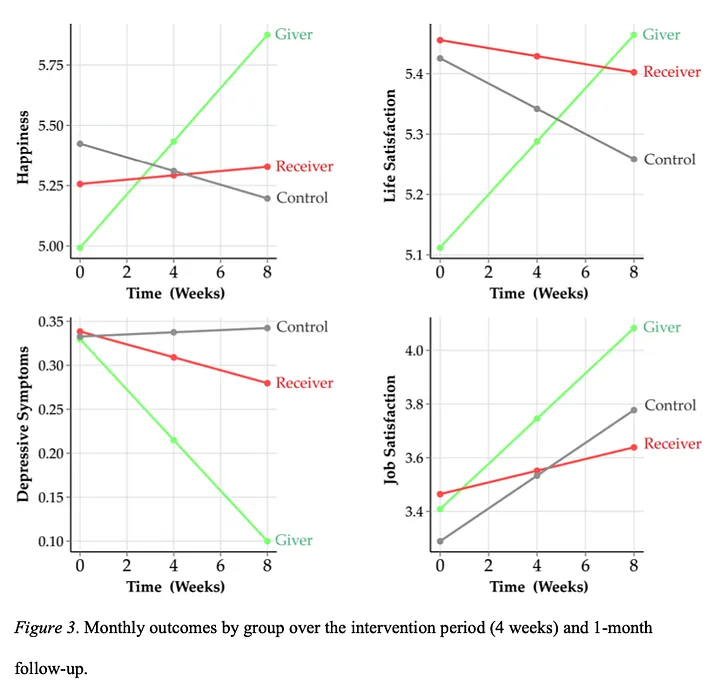
Source: Chancellor, Joseph & Margolis, Seth & Bao, Katherine & Lyubomirsky, Sonja. (2017). Everyday Prosociality in the Workplace: The Reinforcing Benefits of Giving, Getting, and Glimpsing. Emotion. 18. 10.1037/emo0000321.
Trust is the basis of a strong and inclusive workplace
As Carmen Morris, a leading Diversity consultant and Forbes contributor, wrote, ‘Establishing trust to build inclusion is a corporate necessity.’ Trust is the foundation needed for employees to build motivation, confidence, and commitment to their leadership and organizations. Without trust, many of the other elements of an effective workplace crumble. Collaboration, innovation, communication, and more become exponentially more difficult. And trust is demonstrated and built through actions over words.
The benefits of trust in the workplace have proven performance benefits. In a study looking at interpersonal trust among managers and professionals in organizations, the researchers found that prosocial behavior (Kindness) is associated with trust. This, in turn, has downstream effects on peer performance and manager performance. They showed that performing in a more prosocial nature at work is associated with manager’s seeing you as more trustworthy and even higher ratings performance.
Building trust through Kindness is proven to have benefits no matter what your role is. You can be a senior level manager or an entry level employee. Approaching your work and colleagues with Kindness is shown to build trust and have a great impact on the performance of yourself as an individual and the company as a whole.
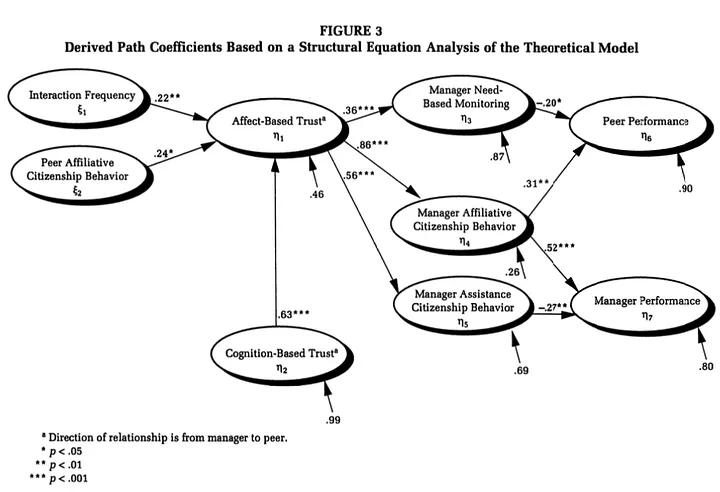
Source: McAllister, Daniel. (1995). Affect- and Cognition-Based Trust Formations for Interpersonal Cooperation in Organizations. Academy of Management Journal. 38. 24–59. 10.2307/256727.
Does your business intend to be around long into the future? Take a deep look at your company culture. Do you lead with empathy? Do your people trust each other? Do you prioritize Kindness? If you aren’t sure, the answer is probably ‘no’. And it’s putting your business at risk. Kindness is the foundational element in our future of work.

